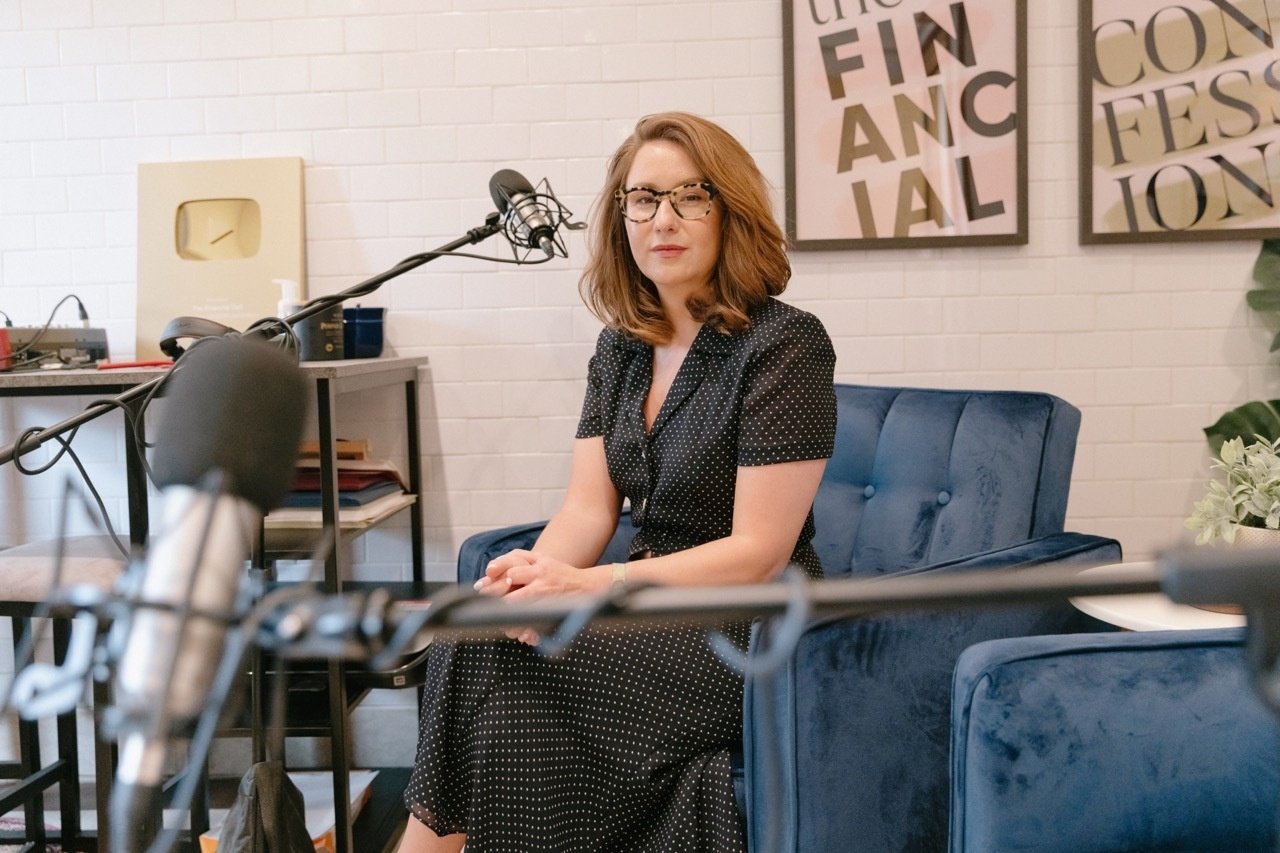Financial Wellness? In this Economy?
03. 8. 2023
9 min.


Journalist and translator based in Paris, France.
It’s a crazy time to be American. Inflation is up and down, mass layoffs among the country’s biggest employers keep coming, AI threatens to usurp the jobs that remain and economists still expect a recession. More than half of America’s employees are considering swapping their jobs for self-employment, according to one survey, as 68% believe they could make more money working for themselves.
So it’s no surprise that calls for increased financial literacy and wellness have become a big feature of the national conversation. Personal finance education is offered in schools in 18 states; three-fifths of American workers consider retirement planning assistance a high priority when choosing a new workplace, says a recent report by Morgan Stanley. But is financial planning possible without the guarantee of a stable income?
Welcome to the Jungle spoke to Chelsea Fagan, author, founder and chief executive of The Financial Diet (TFD), a book and an online resource for personal finance. Below are her tips on everything from surviving inflation to freelance budgeting — and her informed opinions on the policies America needs most.
In your experience, who needs help with financial literacy the most? Any specific age group, community, industry?
I haven’t particularly noticed that there’s one group above others who tend to benefit. I think it’s just very important for people who never really received a financial education, or who have complicated emotional and social relationships to money — which is, unfortunately, quite a lot of people.
An impending economic downturn has a lot of people worried about job security. Do you have any advice?
Doing everything to maximize your own flexibility and employability is always very important. Making sure that you are regularly negotiating, that you have all of your resumes and professional websites and things like that up to date. Making sure that you’re speaking with headhunters from time to time to understand what’s available out there to you, that you’re being aggressive about saving up your emergency funds.
All of these things are always important. Yes, to some extent they’re more important at a time when we have reason to believe that there could be a recession. But in general, there really shouldn’t be a specific way that you operate in possible preparation for a recession because, first of all, we never know when it’s going to happen. (Our economic model wouldn’t work if you could time a recession.) But more importantly, the things you should be doing that set you up as best as possible for a turbulent economy are the things that you should always be doing. Whether or not you think that a recession is coming or whether you think you’re in a particularly volatile industry, these kinds of best practices should just always be in practice.
All this uncertainty has boosted freelancing. Do you have any advice for newly independent workers who are either diving in full-time or adding it as a side hustle?
If you’re a full-time freelancer, always have two budgets: One for when you have a more lucrative month, and one for when you have a more lean month. It’s very important to not have to completely rethink your budget every time your income varies. So generally, being really conservative with how you plan out your budget and making sure that you have automated plans for both scenarios is really, really important.
For those doing it in addition to their primary job, my biggest recommendation is to try and save or invest 75% of your side income. You can play around with 25% because I do think it’s important for people to feel a level of immediate gratification and satisfaction from doing this extra work. And I think it can have real benefits to give yourself that freedom. But it’s really important to make sure that if you are putting in the time and energy to work on the side in addition to your job, you’re doing so for something that will help you long term financially, because otherwise it’s a real waste of energy.
A lot of people’s salaries don’t match the cost of living, do you have advice on how to navigate this?
The vast majority of the people I work with are women, and most of them don’t negotiate whatsoever. So that’s first and foremost. If you are not negotiating, you are automatically putting yourself at a disadvantage, especially now. It’s important to remember that almost all employers have more wiggle room than what they initially offer. And most initial offers are made with the expectation that someone might negotiate. So that is just something that cannot be overstated.
Most people will realize their largest increases in income when they change employers. If you’ve been at a job more than a few years, chances are you’re being underpaid. So taking a close look at what you’re earning compared to other people in your industry, speaking to headhunters, making sure that you are always acting as your own ambassador for your income, is extremely important. Only about 30% of women actually negotiate in professional situations.
Do you think it’s still possible to negotiate in the current climate where we’re hearing about mass layoffs every month?
Yes. A lot of what will hold people back sometimes is the idea that negotiating in a reasonable way will lead someone to rescind a job offer or fire them. That almost never happens — only in an extremely minuscule number of cases. And if you were ever in a situation where you’ve gotten a job offer and the company rescinds your entire offer because you did the professional thing and attempted to negotiate, then you’ve dodged a massive bullet. That was a terrible employer you should never have worked for.
There’s no question it’s worth the risk because the very worst that can happen is they’ll say ‘No’ and you’ll have the same offer that you started with. TFD provides a lot of scripts for negotiation. There are a lot of really good resources out there for how to do it. It’s different in different situations but, for the most part, the rules are the same.
What about those in a tough position to negotiate — who don’t have an emergency fund, or are living dollar to dollar?
A humongous amount of TFD’s content is geared towards people who are very low income. There is never a point at which there is nothing you can do. That simply does not exist. Maybe you won’t be able to save up a full emergency fund right now, but chances are you could probably save a few dollars a month. Maybe you could add a side stream of income.** Maybe you could change some of your expenses. Even setting the most minimal goals, you could say I want to save $5 a month. It does not matter. There’s always something that can be done. And the simple act of putting in place the habits and frameworks that are necessary to reach even the most minimal goals are the battle. And then you just scale that up as much as you’re able to.
It’s also a misconception that only certain people can negotiate. It’s not just white collar workers that can negotiate. It’s not just salaried employees that can negotiate. Freelancers, hourly employees, gig employees, tipped workers can all negotiate. I’ve worked many, many, many different types of jobs, in all different sorts of structures and income levels. There were times when I did negotiate and times when I didn’t. When I did negotiate, sometimes it was yes, sometimes it was no. But in every case, even the less stable jobs, that option was always available to me.
Now, there are situations — for example, let’s say you’re an undocumented worker — you may have no leverage and there may be a severe level of risk associated with having or trying to exercise any kind of autonomy professionally. In extreme cases like that, I’m probably not the person you should be listening to. There are individuals and organizations who are specialized in that kind of situation. But for the vast, vast, vast majority of American workers, these options exist. They may not be on the same scale, but nothing is preventing you from, for example, setting up a budget, even if you’re in the negative every month. And many people are, especially people carrying student debt. Many people live in the negative for years, but just the act of tracking your money and having a budget and understanding what’s coming in and what’s going out is beneficial at every level.
There’s been a burst of recent initiatives to teach financial literacy in American schools. Is this a good place to start?
It can be helpful for sure. But financial education in school is deeply, deeply insufficient. TFD has done educational content for various nonprofit and governmental organizations. And I think that’s really important, and I would love to see that become more a regular part of the curriculum. However, it’s hard because the American education system is just another broken system, right? Whatever education you’re going to get will vary wildly across the board. The experience from school to school is very different. I think these things should be happening, but don’t count on them and don’t rely on them. And don’t make that your sole sort of source of financial education.
Then how should people become financially literate? Is it something they should just research themselves?
You have to do the research yourself. You have to advocate for yourself. I mean, we live in America. We live in an extremely individualistic society. There’s just no way around it. And is it fair? No. Should a lot more of this be publicly subsidized and funded? Yes. But as it stands right now, it is every individual’s… I wouldn’t even say “responsibility,” because I don’t want to insinuate that it’s an ethical obligation for them to do their own research. But if you don’t do it, no one else will.
And don’t get me wrong, if your employer offers you a really great comprehensive workshop with someone like myself — I’ve delivered many of them — take advantage of it. But I don’t think that getting to a place where it’s the employer’s mandated responsibility to educate their employees on finances is a good option. Because we have seen in America how toxic it is to be tying more and more of people’s individual financial livelihoods to a single employer, and how much it undermines labor rights and leverage on the employees’ side. So take advantage of things if they’re made available to you, but again — I’ve given a lot of these talks. I hope that people go home and fact check me. I hope that people go home and do their own research additionally, because no one else is going to do it for you the way you will do it for yourself.
What are the absolute, non-negotiable basics every citizen should be doing to manage their money?
Have an emergency fund, negotiate, automate your savings, have some kind of retirement account even if you’re contributing very little to it. Those would be the big ones.
What policies need to happen to improve financial wellness?
I could spend three days sitting here talking about my wish list of policy changes and regulatory shifts that need to be made. But, I think, very few things will improve unless we redo the tax code.
I don’t think a lot of Americans are aware of how high the marginal tax rate used to be. In the 1950s, it was at its highest with a top marginal rate of 92%. America was at its most prosperous and most economically viable for the middle and working classes when the wealthy were taxed at very high rates. That used to just be an understanding in American culture that has just completely fallen by the wayside. And while there are 100 million problems at any given time, I think economic inequality is definitely one of the biggest.
Are there any PSAs you’d like to get out there about reclaiming your relationship with money in the aftermath of the pandemic?
Money is just numbers. You live in a broken system. The fact that you’re not doing as well as you would like to be is the norm, not the exception. And any moment spent living in shame or emotional turmoil about money is a waste of time. You can take action to better your situation. You can release the things that are out of your control and you can focus on converting what might be a negative feeling into tangible action that will benefit you. But emotional overwhelm is pointless — it just paralyzes you and your ability to improve the situation.
Again, that’s why it’s so important to start by just exposing yourself constantly to the numbers, so they become completely neutral to you. There’s no surprise, and there’s no anxiety — they’re just there. I wasted a lot of time and energy feeling guilty, ashamed, insecure, inadequate and like there was something morally wrong with me because of my money problems. And every single second of that was an utter waste. I wish, looking back, that I had stopped earlier and focused my energy on saying, “Okay, what are three things that I can do today to improve my situation?” And once I’ve done those things, I can check them off, feel good and I’ll start again tomorrow with the things within my control. By the way, this includes things that I did in the past. I ruined my credit at 18 years old. The fact that I was still agonizing about that at 20-something and not just focusing on how to improve my credit score was a waste because what is done is done.
I do want to say one last thing: Wealth in America is a rigged system where most people who are wealthy were born wealthy to some extent. We have fairly low social mobility. Wealth is inherited in a massive way in this country, and people who have money aren’t better than you. They’re not smarter than you. They often didn’t work harder than you. In fact, often they work less hard than you. They just happen to have a lot more luck and privilege. So the least you can do is rid yourself of this notion that the amount of money you have is in any way correlated with your value or your work ethic, because those two things are entirely untrue in America.
Photo: Welcome to the Jungle
Follow Welcome to the Jungle on Facebook, LinkedIn, and Instagram, and subscribe to our newsletter to get our latest articles every day!

Další inspirace: Výplata a odměny

Back to the office, but at what cost? The new era of employee perks and benefits
Employers are prepared to do just about anything to get you to trade your home office setup for an on-site desk ...
22. 2. 2024

You deserve a bonus, don’t you?
How do you ensure your bonus reflects your value, and your goals?
20. 12. 2023

Opportunity transparency at work: What can it do for you?
The promotion process has always been an opaque area for workers, so how can companies illuminate their decision-making?
20. 12. 2023

Who do you need to be to get that raise at your end-of-year review?
Annual reviews are stressful for everyone, and everyone has their own strategy to succeed. So, what's yours?
12. 12. 2023

Is unlimited vacation a bad idea?
While unlimited vacation may sound like a dream, it can also be a recipe for workplace abuse
13. 9. 2023
Zpravodaj, který stojí za to
Chcete držet krok s nejnovějšími články? Dvakrát týdně můžete do své poštovní schránky dostávat zajímavé příběhy, nabídky na práce a další tipy.

Hledáte svou další pracovní příležitost?
Více než 200 000 kandidátů našlo práci s Welcome to the Jungle
Prozkoumat pracovní místa


